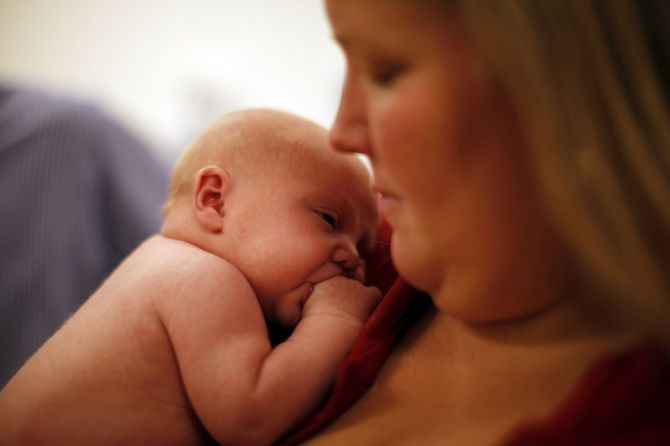Children of Overweight and Obese Mothers Have Delayed Physical Growth

Children born to overweight or obese women are shorter and lighter than those born to mothers of normal weight months after birth, according to a new study showing that a woman's weight affects not only her health by the development of their children.
Researchers said that surprisingly, babies born to overweight and obese mothers gained less weight and grew less in height compared to babies of normal-weight women from just after birth to three months.
Researchers found that infants of overweight mothers on average gained 11 ounces less weight and 0.3 ounces less in fat mass and grew nearly a half-inch less than those born to normal-weight mothers from two weeks to three months.
The new study, published in the Journal of Pediatrics, also found that babies with overweight mothers gained less essential fat mass, which is thought to play an important role in brain development, than those born to normal weight mothers.
"We've found these children are not growing normally," study author Katie Larson Ode, assistant clinical professor in pediatric endocrinology and diabetes at the University of Iowa, said in a news release.
"If what we have found is true, it implies that the obesity epidemic is harming children while they are still in utero and increases the importance of addressing the risk of obesity before females enter the child-bearing years, where the negative effects can affect the next generation," she added.
A 2010 study published in the Journal of the American Medical Association finds that six in 10 American women of childbearing age are overweight or obese, and while children of overweight or obese mothers generally catch up to their peers with normal-weight mothers, they also have a significantly higher risk of continuing to rapidly gain weight in adolescence to become overweight themselves, which would trigger a host of health problems throughout their lives.
"A message from this study is, 'Don't panic,'" Larson Ode noted. "Pediatricians see a lack of (initial) growth, and they assume the child is not getting enough nutrition. But we believe the baby is in fact getting plenty."
Researchers believe that there are two main reasons why babies of overweight and obese women physically develop at a slower pace in early life: inflammation and womb environment.
Scientists say that previous studies have shown that fat cells that normally help suppress a person's immune system actually flare up in overweight adults, and researchers believe that the struggle between fat cells and inflammation in an overweight pregnant mother's immune system may also inflame the babies developing immune system in the womb, taking away energy that would otherwise go to the baby's development.
"These (fat tissue-derived) hormones and inflammatory factors tend to have appetite/satiety regulating effects early on, and may exert their negative effects on growth both during gestation and through passage into the breast milk during postnatal development as well," co-author Ellen Demerath of University of Minnesota, explained in a news release.
Another reason why babies of overweight women may have stunted growth is because free fatty acid-derived growth hormones secreted by the overweight mother and growth hormones produced by the pituitary gland in the baby's brain act together to slow down the production of the growth generating pituitary gland responsible for the fetus' physical growth.
Therefore, after the baby is born and cut off from the mother's growth line, their pituitary gland is not developed enough to pick up the slack, researchers hypothesize.
"It's just not mature yet," explained Larson Ode.
The results were based on 97 mothers, of which 38 were overweight or obese and none of the participants were diabetic.
Researchers noted that because the sample size of the new study was small, the latest findings should be confirmed by a study with a larger sample size.



























